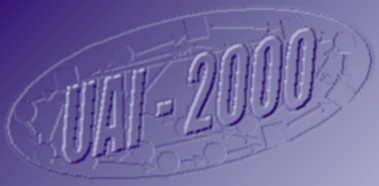

The Sixteenth Conference on Uncertainty in Artificial, UAI-2000, will be held from June 30 - July 3, 2000, at Stanford University. Three workshops will be held in conjunction with UAI-2000, on June 30, 2000.
Statistics and inductive machine learning are data-oriented tasks in which domain models are induced from data, but databases are not the only resource from which models can be derived. Domain knowledge is still an important resource, and refinements in knowledge engineering have made the construction of knowledge-based systems more tractable. But when both data and domain knowledge are available, how can these two resources be used together for the construction of decision support systems?
The aim of the one-day workshop is to critically examine current approaches to integrating domain knowledge with data (knowledge-data fusion) and identify future areas of research. The emphasis is on sound theoretical frameworks rather than ad hoc approaches.
Topics of interest include (but are not limited to):
Contributions describing work in progress as well as position papers are invited. Of particular interest are papers that combine theoretical discussion with practical examples, and papers that compare different approaches.
The workshop will interest researchers working in artificial intelligence (uncertainty reasoning, machine learning, and knowledge engineering), decision theory, and statistics.
The papers presented at the workshop will be published as Workshop Notes. Authors of the more interesting papers will be invited to write full-length versions to be published in a special issue of the International Journal of Uncertainty, Fuzziness, and Knowledge-Based Systems.
Additional information can be found at http://www.umds.ac.uk/microbio/richard/kdf2000/main.html
Modern biology is undergoing a major shift in methodology: New technologies and data gathering projects, e.g., Human Genome Project, are turning out biological data at a very fast rate, well beyond the capacities of traditional research methodologies. To make sense of these large amounts of data, biologists turn to computational tools. The development of these tools and their application to biological data is one of the most active and exciting areas of interdisciplinary research today.
Probabilistic models are playing a central and increasing role in computational molecular biology. Few examples include:
The probabilistic models used in these applications are closely related to the models investigated by the UAI and Machine Learning communities. Moreover, many of the algorithmic tasks are similar, such as inference, learning parameters from incomplete data, and model selection.
The purpose of this workshop is bring together researchers working on problems in computational molecular biology and researchers from the UAI and Machine Learning communities. The aim of this interactions is to form new interactions between these communities. We believe that such an interaction would be fruitful for both sides and can lead to the application of recently developed inference and learning methods for solving computational biology problems, as well as better understanding of the new challenges that are posed by by this type of applications.
We encourage submission of papers that report on application of probabilistic methods to computational biology problems, papers on recent computational and statistical methods that are potentially relevant to computational biology. These might include computational tools for inference and learning in probabilistic models of sequences and recursive structures. Researchers interested in attending the workshop may also submit a statement of interest.
The workshop will be a one-day meeting. It will consist of invited talks and presentations of submitted papers, with adequate time after each presentation for open discussion. The number of papers presented will depend on the number and quality of the submissions received.
As efforts to tackle larger and more complex sequential decision problems have increased, there has been an explosion of interest in generalizations to the classical Markov decision process (MDP), as well as planning and learning algorithms that attempt to cope with or exploit these richer representations. Examples of this trend include:
The purpose of this workshop is to provide an open-ended forum for these and other representations and algorithms that attempt to stretch the applicability of classical MDP and RL methods. We encourage the submission of one-page abstracts on these and related topics. The workshop sessions will be organized around talks and discussion sessions focused on accepted submissions. Submissions should be sent in PostScript, PDF, or ASCII format by email to mkearns@research.att.com.